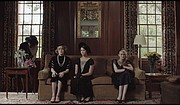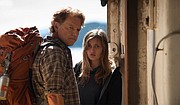Robbie Fisher, President of the Crossroads Film Society, standing next to the art work for this year's Ruma Award. Photo courtesy Clay Hardwick
Wednesday, April 8, 2015
This year, the Crossroads Film Festival celebrates 16 years of providing Jacksonians with a creative, cultural and cinematic outlet. The festival, held at the Malco Grandview Cinema, features films from all over the world, including some from right here in Mississippi. All-access passes for the whole weekend, April 9-12, are $45 regular admission or $35 for Crossroads Film Society members, seniors 65 and older and students. General admission to the Great Southern Music Video Showcase, Thursday, April 9, are $5. Saturday passes are $20 regular admission and $15 for members, seniors and students. A membership to Crossroads Film Society is $35 regular price and $25 for students. Admission to Friday's showing of "Battlecreek" and "Clown Service" are $10 general admission and $8 for members, students and seniors 65+. Individual film blocks are $8 regular admission and $6 for members, seniors and students. For the complete event schedule and to buy tickets, visit crossroadsfilmfestival.com. Here are reviews of some of the featured films.
Becoming an Adult (Kind Of)
by Amber Helsel
In one of his classic poems "The Road Not Taken," poet Robert Frost wrote, "Two roads diverged in a wood, and I took the one less traveled by, and that has made all the difference."
People often use that as a metaphor for taking the high road in a tough situation or staying on your own path when everyone else goes astray.
When Anna Norris, (Anna Petrie Hill) uses it in the short film "Adult-ish," she's using it as a way to show her parents that even if she is 18, she's ready to start her life as an adult.
The concept of the film, which Alec Martin directed for the 2014 Mississippi 48 Hour Film Project, is pretty simple, which is what makes it fun to watch. Anna writes a letter to her parents, Jayla and Jared Norris, explaining to them that she's bought a house because it's closer to her new internship, and she feels like she's ready to begin her journey into adulthood. Her parents look annoyed because it's pretty obvious that she doesn't actually know how to be an adult. They know that it's more than just shaving your legs twice a week and knowing not to eat Oreos for every meal (both things she mentions when trying to show that she's ready).
Of course, anyone who has graduated college, even those who are just about to, have figured out that saying you're an adult is quite different than being one. But we've all been in Anna's shoes. We've all thought when we were 18 or 19 that we were ready to live on our own, and to be fair, some of us were, (I was not one of them, however).
Judging by the awards the film won in the 48 Hour Festival (Best film runner-up, Audience Award, Best Director, Best Writer, Best Actress and an Honorable Mention for production design), it's pretty obvious that many people can relate to the film.
"Adult-ish" is on Screen A at 5 p.m., April 11, in the "Shorts 7: Mississippi Showcase" block at Crossroads Film Festival April 9-12, hosted at Malco Grandview Cinema (221 Grandview Blvd., Madison). For more information, visit crossroadsfilmfestival.com.
Love in the Magnolia State
by Richard Coupe
Robbie Fisher produced and Lauren Cioffi directed and shot a beautiful film on many levels with "A Mississippi Love Story." It demonstrates love for another, love for Mississippi and the South, and the love of a parent for a child. It's also the story of how a parent can surprise that child by accepting who they love. It is about the struggle for acceptance that we all face in one way or another.
The short, 13-minute documentary follows Eddie Outlaw (a frequent contributor to Jackson Free Press) and his now-husband Justin McPherson, owners of William Wallace Salon and Fondren Barber Shop, as they describe the struggles and victories of trying to be who they are in an often less-than-hospitable South. The unique use of animation to transition between scenes in the film adds flavor and grabs your attention. The film will pull you in and have you rooting for the good guys (Eddie and Justin, whose California wedding is in the film) and crying with frustration over the obstacles in their path to happiness and the setbacks they experience.
The U.S. Supreme Court's debate over the Defense of Marriage Act, which would have barred the federal government from recognizing same-sex marriages (the court ultimately decided that it was unconstitutional), serves as a backdrop to Outlaw and McPherson's journey. One segment shows images of protests for and against gay marriage, In one part, the camera goes to a woman holding a poster with these words printed on it: "Gays have every right to be as miserable as I make my husband."
"A Mississippi Love Story" is on Screen B at 7:10 p.m., Saturday, April 11, in the "Shorts 8: LGBTQ Block" block at Crossroads Film Festival April 9-12, hosted at Malco Grandview Cinema (221 Grandview Blvd., Madison). For more information, visit crossroadsfilmfestival.com.
Around the Clock
by R.L. Nave
"Without the western river system, the United States would shut down," declares the captain of the Motor Vessel Mary Parker in the film "Barge," Mississippi native Ben Powell directs.
The Mary Parker is a tugboat working out of the Port of Rosedale, Miss., towing barges up and down the Mississippi River as far south as New Orleans. Its crew (none are identified in the film) is made up of eccentrics, ex-convicts and formerly down-on-their-luck guys who found renewed purpose working on the river in 28-day stints.
Sometimes, as the film depicts, deckhands don't adjust well to the strenuous round-the-clock labor. For the good of the whole crew, the captain must let them go.
Similar to life on a barge, the film ambles along without reaching a dramatic climax. "Deadliest Catch" it is not. Instead, "Barge" simply and beautifully introduces us to some of the people that play an important role to our nation's commerce.
The captain sums up the job this way: "There's not one thing you don't touch, use or drive on, daily, that was not in a barge. When you get in your car and leave your driveway—guess what? Concrete was probably in a barge. The tires you're rolling on? The petroleum to make them was in a barge. When you pull out on an asphalt road, that stuff was in a barge. Styrofoam plates, plastic cups, plastic chairs—all the stuff that was involved in making that stuff was in a barge at some point."
"Barge" is on Screen A at 11 a.m., Saturday, April 11, in the "Shorts 2: Mississippi Documentaries" block at Crossroads Film Festival April 9-12, hosted at Malco Grandview Cinema (221 Grandview Blvd., Madison). For more information, visit crossroadsfilmfestival.com.
Coffee and Canvas
by R.L. Nave
Ever been so distraught to have run out of coffee that you don't remember where you've put your wallet, and then you rush out to the market before remembering to put on shoes and don't even notice that there's a beautiful naked girl on the sofa of your studio apartment? If so, you can empathize with the main character of "Coffee" from director Pouya Eshtehardi.
This short film stars Kasra Kalami as an artist with painter's block who spends his days staring at a blank canvas and sipping cups of kettle-brewed java from the solitary hot plate in his tiny apartment that overlooks a busy interstate. Our artist goes from the coffee pot to the window to his virgin canvas back to his coffee pot. Then, he notices the winsome April Amoretto, who, ironically, also appears in a film called "Silence of Paintings," which could have easily been the "Coffee"'s title. She wastes no time in awakening the artist. The film's grayscale fades to color as the temperas, palettes and brushes on the artist's table come alive with color. He shares his beloved coffee; he paints. Once the masterpiece is at last finished and the coffee is again depleted, what will become of our artist and his muse?
"Coffee" is on Screen A at 7:20 p.m., Saturday, April 11, in the "Shorts 9: Romantic Comedies from Around the World" block at the Crossroads Film Festival April 9-12, hosted at Malco Grandview Cinema (221 Grandview Blvd., Madison). For more information, visit crossroadsfilmfestival.com.
Mississippi Sisters
by Genevieve Legacy
"Olivia Martha Ilse" is a narrative short film set in Depression-era Mississippi that follows three sisters—Olivia, Martha and Ilse—as they grow up. Actress Jaclyn Bethany, a Jackson native (and former JFP intern), joined forces with Los Angeles native Sophia Kiapos to make the film. Anton Chekhov's play "Three Sisters" inspired the film, which is set on an estate in the Mississippi Delta in the 1930s instead of a provincial town in Russia in the 19th century.
The film opens with a birthday party for Ilse at the family estate. Andrew, Ilse's brother and caretaker, introduces the family to his fiance, Nora, and his business associate, William Bailey. To the sisters' dismay, after Nora moves in, she systematically insults and mistreats everyone in the household.
Shot on location in Mississippi, the rich colors and interior, period costumes and makeup in the film offset the compactness of the story. The cast includes several recognizable faces. James Frain ("True Detective" and "Sleepy Hollow") plays William Bailey; Tammy Blanchard ("Into the Woods") plays Nora; Greenwood native Tonea Stewart ("The Rosa Parks Story" and "A Time to Kill") plays Eloise; James Harkness ("Unforgettable" and "Silent Witness") is Andrew; Jaclyn Bethany ("Get on Up") is Martha; Lindsey Newell ("Introverts") plays Olivia; and actress C.C. Kellogg stars as Ilse.
"Olivia Martha Ilse" is on Screen A at 5 p.m., Saturday, April 11, in the "Shorts 7: Mississippi Showcase" in the Crossroads Film Festival April 9-12, hosted at the Malco Grandview Cinema (221 Grandview Blvd., Madison). For more information, visit crossroadsfilmfestival.com.
Steven Spielberg for President
by R.L. Nave
Take elements of "The Godfather: Part III," the black political comedy "Wag the Dog" and any given episode of "Law & Order," and you arrive at Lorenzo Berghella's "Too Bad."
It all takes place in Bangland, a major city in dystopian America, where Steven Spielberg is the Republican president facing re-election. As Election Day nears, President Spielberg wages war against the fictional African nation of Mahaba and launches a propaganda campaign that casts all nonwhites as terrorists. In the final scenes, African Americans, including what appears to Bloods and Crips street gang members, wage an insurrection.
Amidst the chaos, which conspires to muddle the story in places, Berghella weaves narratives of five characters, including a pair of mob-enforcer types named Toucan Charlie and Tony Beretta, loan shark Loogie Boogie and his unruly family, Christian-series TV writer Dante Blank, and a televangelist named Gold who strongly resembles actor Bill Murray.
It's also in Italian and has subtitles.
"Too Bad." is on Screen A at 3 p.m., Saturday, April 11, in the "Shorts 5: Visually Striking & Experimental" block in the Crossroads Film Festival April 9-12, hosted at the Malco Grandview Cinema (221 Grandview Blvd., Madison). For more information, visit crossroadsfilmfestival.com.
Leading the Way
by Amber Helsel
In the short documentary "Leadway," Cindi Quong Lofton says her father, Alfred Quong, was like the Chinese James Dean. He loved Harley-Davidson motorcycles and muscle T-shirts and wore his long hair in a ponytail.
"He wasn't the stereotypical Chinese grocer that you would imagine," Lofton says in the film. Quong and his wife, May Chin Quong (Lofton's mom), owned Leadway Grocery in Shaw, Miss., until his death in 2007.
In the film, Lofton recalls her memories of the grocery stores, from the color of the tiles in the downtown location to how Quong would often do business on credit if people were having money problems.
On Sept. 19, 2007, Shaw locals Joshua King and Terrance Stanton shot and killed Quong and So Ha Jung, an employee at Leadway. Almost a year later, on Sept. 17, 2008, King and Stanton were indicted for two counts of capital murder. King's trial ended in a mistrial in July 2009. Dec. 14-16, 2010, the Circuit Court of Bolivar County retried King and found him guilty on both counts. The trial court sentenced him to two life sentences. King appealed to the Mississippi Supreme Court in 2011, but after the court found no errors in court proceedings, the judges affirmed his conviction.
In the film, Lofton said her family was devastated after his death. "Leadway" follows Quong in her journey to continue her father's legacy of helping everyone he could and to building people up. She now works at Community Counseling Center in Shaw. She also mentors kids in the local school system, including one named Will Dukes, who is 14. She says she does this to give him and other students someone to look up to.
"If these kids don't have someone to take them under their wings and guide them, then they end up running the streets," she says.
"Leadway" is on Screen B at 3:10 p.m., Saturday, April 11, in the "Shorts 6: Mississippi Culture Block" in the Crossroads Film Festival April 9-12, hosted at the Malco Grandview Cinema (221 Grandview Blvd., Madison). For more information, visit crossroadsfilmfestival.com.
Olde Hats and Old Friends
by Ronni Mott
Rudy's Olde Hat still fronts onto Highway 42 about where Petal and Hattiesburg meet, although the original proprietor, Rudy Boutwell, has been dead for several years. Look for the faded signage: Used Antiques, Primitives, Collectibles.
The store is no longer open, but you can still look in the window and see the items piled floor to ceiling. The store had tall, twisting aisles leading around and between the wares that could defeat the narrowest Walmart shopping cart. But this wasn't Walmart, except maybe in an alternate universe kind of way.
Rudy's specialized in selling castaways of 20th-century made-to-be-disposable paraphernalia—Mickey Mouse toys and anonymous doll parts, Fisher Price music boxes, portraits of Captain Kirk and Jesus, mismatched plates, gravy boats and shoe stands, and maybe a chair or two you could actually sit in. Surely, some priceless treasure lay hidden here, gathering dust and cat hair from Boutwell's unnumbered felines.
"Don't do any climbing and try not to rearrange," Boutwell would tell visitors.
Some would call it a junk store. For Herman Snell, Rudy's Olde Hat was a singular, if quirky piece of Americana, and Boutwell was a harmonica player in a top hat with a story. In 2003, Snell began shooting a documentary at Rudy's. He never finished it. Like Boutwell and his store, Snell defied categorization. A self-described free-thinking eclectic, in 2002, Snell became the first music editor for Jackson Free Press, a position he held until his death in 2010. He directed the Crossroads Film Festival from 2004 to 2009. He painted and loved ancient music, rock 'n' roll, funk and zydeco.
Snell met Philip Scarborough, co-owner of Spot On Productions LLC, when they both attended the University of Southern Mississippi, and they reconnected in Jackson through Crossroads, eventually becoming collaborators. "When we would screen films for Crossroads, if there was this weird, experimental film everybody hated, he would love it," Scarborough says, explaining why the festival named an award for film innovation in Snell's honor.
Late last year, Scarborough finally completed "Rudy's Olde Hat." He compiled the 14-minute film from the footage Snell directed and they both shot, spending months reviewing, categorizing and editing. One of Scarborough's guiding principles was, "How would Herman edit this?" he says. Would it reflect Snell's inventive spirit?
Ultimately, Scarborough decided that Boutwell was quirky enough. In the film, his voice describes the store ("A little of this and a little of that."), and its contents help narrate his life. Snell and Scarborough spent hours with Boutwell, following him as he described his wares, played music and sang, and talked about women, dogs and life. Abandoned as an infant, Boutwell spent his childhood in a series of "homes for destitute boys" in New Orleans. He never married and never fathered children.
He was also hard-pressed to sell any of the random items that he collected over 80 years even though nothing was really worth much—unless "somebody comes and wants it," he said. "Whenever something becomes obsolete, the value goes up," Boutwell declared, a philosophy that counters any known capitalist logic.
"He overpriced everything," Scarborough says. "It's like he didn't want to let go of anything." Boutwell might price a jar of buttons at $50 or a scratched plate with Andy Gibbs' face for $25.
Fourteen minutes can't tell the whole story of a man's life, of course. Like the fact that Boutwell had a long, decorated military career that spanned World War II, Korea and Vietnam. Or the fact that he lived in the store, in a room packed with books and magazines, varying in decor from his shop only because it contained Boutwell's bed.
"Rudy's Olde Hat" is partly a tribute to his old friend, Scarborough says, but it took a couple of years after Snell's death in 2010 to even begin the process. Few knew of the gastric-bypass surgery Snell underwent, and when complications took his life at age 40, many of his close friends were gobsmacked.
"I'm still kinda mad at him for that," Scarborough says.
"Rudy's Old Hat" is on Screen A at 11 a.m., April 11, in the "Shorts 2: Mississippi Documentaries" block at the Crossroads Film Festival April 9-12. You can also view "Rudy's Olde Hat" at https://vimeo.com/114387325. For more information, visit crossroadsfilmfestival.com.
Wandering in the Desert
by Richard Coupe
"Wandering Rabbi" is a short documentary on just that—a wandering rabbi—although Rabbi Marshal Klaven calls himself a circuit-riding rabbi. Klaven has a fixed routine visiting rural Jewish congregations that are too small to have a dedicated rabbi. He covers 110 congregations from Texas to Virginia. The film partially focuses on the rabbi and his interactions with the communities across Mississippi.
Henry Wiener made the film as part of his master's degree program at Stanford University. The story focuses on the mostly rural Jewish communities in Mississippi.
The film opens on scenes of rural Mississippi shot from a car window to the accompaniment of jazz. Upon first seeing Klaven, it may be obvious to the viewer that he is no ordinary rabbi. He is a youngish man with an infectious grin, a neatly trimmed goatee and muscular arms covered in tattoos.
One scene shows Klaven bowling with the Ole Miss Hillel, an organization for Jewish students at the university. He throws the bowling ball the entire length of the ally for a crashing strike.
The film also focuses on the decline of a once rich and vibrant Jewish community in Mississippi. At one congregation, a member says that the average age of its congregants is 70. At another, the average age given is "deceased." The last scene is quite poetic. The rabbi wanders the Windsor Ruins in Claiborne County. With the majestic columns as a backdrop, Klaven contemplates the future of Jews in Mississippi.
"Wandering Rabbi" shows on Screen B at 3:10 p.m., Saturday, April 11, in "Shorts 6: Mississippi Culture Block" in the Crossroads Film Festival April 9-12, hosted at the Malco Grandview Cinema (221 Grandview Blvd., Madison). For more information, visit crossroadsfilmfestival.com.
Ode to Alaska
by Genevieve Legacy
Director Frank Hall Green's feature film "Wildlike" is a meditative and artful exploration of loss, betrayal, friendship and healing in the unspoiled terrain of the Alaskan frontier. Traveling to multiple locations within a vast setting, the film is a hybrid of drama, road trip and nature film. With a minimum of dialogue, Green makes good use of silence and soundtrack. The characters reveal themselves through subtle means: nervous habits, facial expressions, gestures and actions.
The story centers on Mackenzie (Ella Purnell of "Maleficent"), a troubled teenage girl who has recently lost her father. While her mother is in treatment in Seattle, she sends her to Juneau, Alaska, to stay with her uncle (Brian Geraghty of "Flight" and "The Hurt Locker"). After he betrays Mackenzie's trust, she runs away and tries to get back to Seattle. On the way, she meets a middle-aged hiker, Rene Bartlett (Bruce Greenwood of "Endless Love" and "Star Trek: Into Darkness"). Bart befriends Mackenzie and helps her get home.
Alaska's undeniable sense of place permeates the film, which Green shot in Juneau and the Denali National Park and Preserve. Long sequences filmed in Denali's six-million-acres are the highlight of the film. More than mere setting or backdrop, the dramatic landscape is the movie's ever-present fourth character.
As Mackenzie and Bart explore Denali, the awe-inspiring wilderness carries the story and its inhabitants toward resolution.
"Wildlike" shows on Screen C at 5:20 p.m., Saturday, April 11, in the features block at Crossroads Film Festival April 9-12, hosted at Malco Grandview Cinema (221 Grandview Blvd., Madison). For more information, visit crossroadsfilmfestival.com.











Comments
Use the comment form below to begin a discussion about this content.
Sign in to comment
Or login with:
OpenID